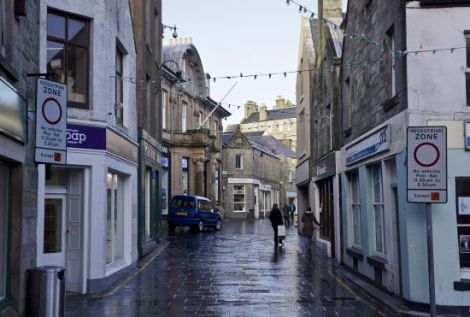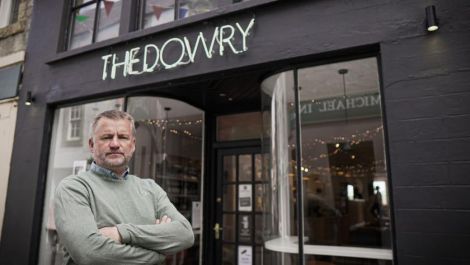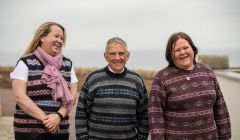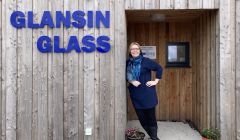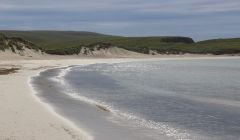Business / Retail and hospitality sectors ‘cautiously optimistic’
As restrictions on normal life start to be lifted, Neil Riddell speaks to the owners of local retail and hospitality businesses about their expectations
IF THE past 12 months of the Covid-19 pandemic have taught us anything, it is not to make too many assumptions about what the future has in store.
But with half the Shetland population having received a first vaccine and restrictions likely to be eased in April, perhaps for the first time in a while there seems to be the beginnings of cautious optimism within the small business community.
Although Shetland has technically remained in level three since Boxing Day, which allows shops and hospitality to trade with some restrictions, in practice many firms voluntarily shut up shop for the whole of January and beyond.
But the majority of cafes and shops are now open for business again and, following a month without any local Covid-19 cases, anecdotally owners generally speak of a gradual improvement in footfall since the start of February.
Folk can also now browse books again in the Lerwick library and visit the museum, while leisure centres have begun reopening in phases.
Emma Miller of town centre umbrella body Living Lerwick said it was hard to gauge exactly how many businesses were getting back up to speed with many office staff still working from home and premises operating behind closed doors.
“I think all the shops are open now,” she says, “but many still have reduced hours in place. This is probably due to the lower levels of footfall and it being unsustainable to pay full staff costs during these very difficult trading conditions with the government message still telling people to stay at home.”
Miller said she felt some businesses “might like to see a bit more detail” on plans for moving out of the current restrictions.
With the remainder of pupils returning to school in mid March, later in the month Scotland’s first minister Nicola Sturgeon is expected to provide further information about how and when restrictions might be eased this spring.
Become a member of Shetland News
Political talks are continuing about the introduction of testing for anyone entering Shetland, which many in the community hope could lead to an earlier relaxation of restrictions here than on the Scottish mainland.
“If we can safely move back down to tier one or zero and allow people more freedom, provided the vaccine rollout and zero case numbers continue, then that can only be a positive thing for our community and our economy,” Miller says. “For safety’s sake, we absolutely can’t be hasty about moving out of the higher tiers, but I think we can be sensible about it.”
Ian Pagulayan, owner of Burns Lane Clothing and co-owner of InterSport and Cee & Jays, says trade is still “far from our normal March or normal February” but “we are seeing more footfall” on Commercial Street, with consumer confidence slowly picking up in recent days.
“We’re kinda lucky that we can run the shops with one staff… obviously it’s putting a bit more work on every staff, but this is how we can cushion the impact of what’s been happening,” he said.
“I think it’s brilliant that nearly 50 per cent of the population in Shetland [has been] vaccinated. It’s not just businesses, but socially, emotionally it is affecting a lot of people now.”
Pagulayan speaks of “optimism, but cautious optimism” as he looks ahead to the remainder of 2021. Given that Chancellor Rishi Sunak extended the furlough scheme until the end of September in this week’s budget, that caution is understandable.
“We cannot be thankful enough for the support of the local population and local community,” he continues. “We are at least able to sustain the business using all the government support, but without the local support it’s nothing.”
While the clothing and sports shops rely primarily on local custom, Pagulayan hopes for the sake of neighbouring businesses that tourism returns later in the year.
“Tourism-wise it doesn’t affect us that much but it doesn’t mean we don’t care. If there’s more people, tourism and hospitality are doing well, the shops will be doing well too.”
With the exception of compulsory closure during the first spring 2020 lockdown, Westside Pine has kept its doors open throughout and owner Janet Davidge says trade has been “steady” so far in 2021.
“We are so glad that we’ve stayed in tier three and been able to open,” she says. “I’m really hopeful that people will continue to shop locally throughout the rest of the year.
“There’s definitely more people around as the Covid numbers go down and confidence rises. Good to see and hopefully [it] will stay that way.”
When Covid-19 first reared its unwanted head, Nicola and Magnus Johnston were in the process of expanding their Island Larder enterprise as they moved into larger premises on Da Street.
Nicola says trade has remained steady throughout at their enlarged shop, and she is also happy with how their street food takeaway has performed since opening in the autumn.
“It’s obviously not as busy as it would be under normal climate and circumstances – we’ve just got to adapt and get on with it,” Nicola says. “Everybody has just been consistent and careful and respectful – implementing that three things in our shop it’s kinda run smoothly, and we’ve not really seen any difference since we opened our doors.”
She is hoping for a “positive summer” and “can’t wait for everybody to feel better about everything, and start seeing them normally”. Displaying a liberal helping of Whalsay determination, she adds: “If we’re going to be brought down they’ll have to drag me down trying!”
Disruption has been greater for sit-in hospitality premises which are currently unable to open beyond 6pm or to sell any alcohol on-site.
Leading Lerwick eatery The Dowry shut down for January, restricted to evening weekend takeaways.
But after opening three days a week through February, owner Stuart Fox has just taken the decision to return to six daytime openings a week having seen an uplift in trade of 15 per cent during the second half of the month.
“Anecdotally, there does seem to be more folk out and about, perhaps with lighter nights and [a] drop in transmission rates,” he says. “We’ll be happy if we can build up trade over the next couple of months in the hope that we can fully open [from] late April onwards.”
Across in Scalloway, Terry McCaffrey at The Cornerstone café/bar has been back open for around a month. Trade is “very up and down” and “nothing compared to what it should be”.
But he describes himself as an “optimist” amid all the uncertainty: “The only thing is the breakfast trade and the lunchtime trade at the moment and it’s not enough to survive, but survive we will!”
McCaffrey received his first dose of the vaccine last week and paid tribute to NHS Shetland for “doing everything they can to bring us into better times”, describing it as a “well-oiled machine”.
“I speak to people on a daily basis that I haven’t seen, and they are starting to feel more relaxed. Older folk are starting to come back, starting to feel more confidence since the vaccine started and how well it was rolled out.”
The Cornerstone also has some guest rooms and, though unsure whether there will be any kind of tourist season to speak of, he hopes that “people will holiday local if they’re allowed to”.
“Although we don’t have any bookings at the moment, I’m optimistic. Being in business in Shetland, we’re probably in a pretty strong position to pick up some of that [domestic tourism] trade.”
McCaffrey adds: “There will be people who are not going to make it; I just have to keep in the frame of mind that we’re going to make it through.”
Become a member of Shetland News
Shetland News is asking its readers to consider paying for membership to get additional perks:
- Removal of third-party ads;
- Bookmark posts to read later;
- Exclusive curated weekly newsletter;
- Hide membership messages;
- Comments open for discussion.
If you appreciate what we do and feel strongly about impartial local journalism, then please become a member of Shetland News by either making a single payment, or setting up a monthly, quarterly or yearly subscription.






